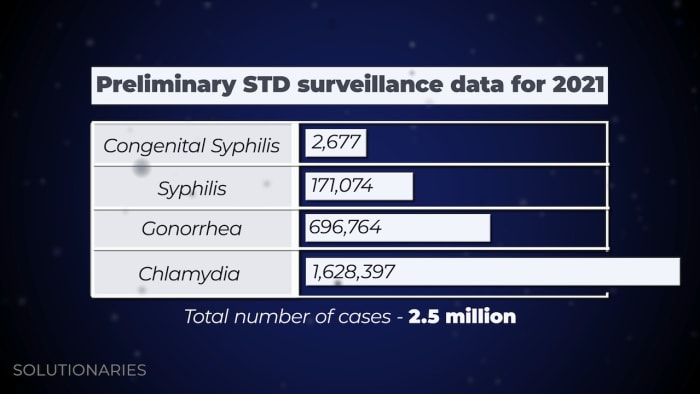The Centers for Disease Control and Prevention released preliminary data, which shows a surge in the number of STD cases around the country. The number of cases rose to 2.5 million in 2021, and health experts are urging people to take their sexual health seriously.
According to the CDC, commonly reported types of sexually transmitted diseases include, chlamydia, gonorrhea and syphilis. People who have an STD are more likely to contract HIV, according to the CDC. If left untreated, HIV develops to AIDS.
Dr. Cherise Rohr-Allegrini is the chief executive director of the San Antonio AIDS Foundation, expressed her frustration.
“We can prevent, we can treat and we can manage. Treatment is prevention, because if you’re not treated then you’re continuing to spread it and give it to someone else. There’s still a lot of stigma, there’s a lot of fear about coming for testing, people don’t like to come in and tell you what’s going on in their personal life. Most people know that SAAF is a safe place to come and that you can come here and talk honestly and get good information and support,” she said.
SAAF is a nonprofit organization founded in 1986 and has provided care to low-income HIV-positive men, women and transgender individuals.
“We started as a hospice, basically people were dying of AIDS they didn’t survive. So it was a place to provide safe, comforting care to people who had HIV and often didn’t have family to support them. As medication changed, evolution of HIV changed. People are living with HIV rather than dying of AIDS. We transitioned our care to become more outpatient focused. We don’t have a nursing home anymore. Instead, we provide wrap around services. We do everything to help a person stabilize their lives,” Rohr-Allegrini said.
See the latest videos from the Solutionaries team now on YouTube.
Other services offered include case management, housing support, on-site and mobile testing. Rohr-Allegrini said it’s important to shatter the stigma around STDs by continuing the conversation.
“Every opportunity that we can to talk about it and normalize it makes a difference. So we are doing focus groups with parents, care-providers, to really just normalize the conversation, so people know they can come to us. We’re trying to reach out into different community groups but it’s hard because people are still afraid to talk about it,” she said.
The conversation is also taking place outside metropolitan areas. Community Action Inc. of Central Texas holds a similar mission to that of SAAF, but with a focus on rural communities.
Carole Belver is the former executive director of the nonprofit organization. She said residents in rural communities face different obstacles, which is why outreach is paramount.
“Outreach is to be able to reach those communities that really need our services, especially those rural communities that don’t have access to internet, or they don’t have access to transportation. We have been around for a very long time an have built the trust with the rural community,” she said.
CAI serves a health, education and human services agency. In 1988, the organization became the major HIV/AIDS service provider for the rural area outside of Austin. Services offered include education, testing, counseling and intensive case management.
However, only one clinic remains open to serve the ten counties, which Belver said put a strain on resources and access for patients seeking services.
“When we first started we, of course, were one clinic and we grew to 13. Unfortunately, as time has gone on, we are down to one clinic in the San Marcos area, and this primary due to budget cuts from the state and feds. We go to the university quite frequently, the Texas State, here in San Marcos. We go to health fairs, local health fairs — any place that will invite us, we will go. We send people, we give out information. We try to do as much outreach as we can with the limited staff that we have,” Belver said.
Despite the challenges, Belver said their mission and conversation will continue.
“Sometimes, we have to fight a little harder to get the support we need, but we are there and our clients need us each and everyday. I don’t think anybody has all the answers, but together we can try to find those the answers together and work out the best thing for everyone involved,” she said.
This article is part of “Solutionaries,” our continuing commitment to solutions journalism, highlighting the creative people in communities working to make the world a better place, one solution at a time. Find out what you can do to help at SolutionariesNetwork.com.
Copyright 2023 by KSAT – All rights reserved.
Discovered on: 2023-03-28 14:46:00
Source: How organizations are working to shatter stigma on sexual health



